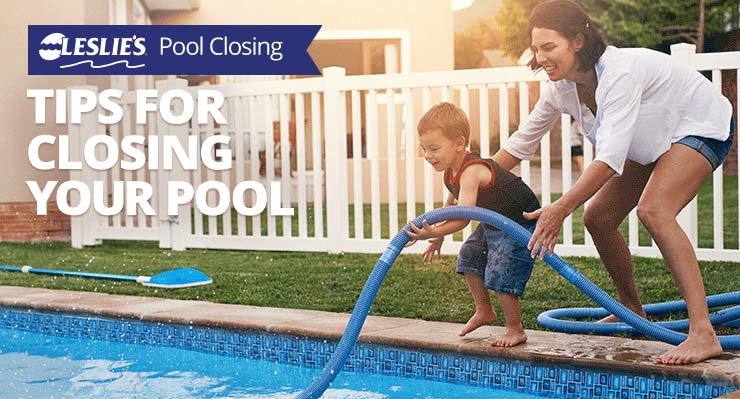
Top 10 Tips for Closing Your Pool
Winterizing a pool may seem complicated, but with a little preparation, it can be a very simple and pain-free process. Leslie’s Top 10 Pool Closing Tips will help you close a pool quickly and easily!

1. Start the Process One Week Before Closing Your Pool
One week before closing your pool, add a phosphate remover to eliminate algae's primary food source and help prevent potential algae blooms. We recommend waiting to close your pool until the water temperature is consistently below 65 degrees Fahrenheit. Closing too early will put your pool at an increased risk for algae growth, because it flourishes in warmer water.
2. Brush and Vacuum to Remove All Debris
Cleaning your pool before closing for the winter helps prevent algae and makes your spring opening even easier. Make sure to thoroughly brush the sides and floor, skim the surface, and clean out the skimmer and pump strainer baskets after vacuuming the pool.

3. Manage Your Water Level
If you live in a freezing area, the water level should be about 4–6 inches below the skimmer or tile line. If you own a vinyl liner or fiberglass pool, draining much water is not recommended. When available, always refer to the pool builder's or manufacturer's recommendations for winter water levels.
For non-freezing areas where you won't be disconnecting the equipment, the pool should remain filled at normal operating levels or higher.
4. Balance the Pool Chemistry
This is one of the most important pool closing tips. Measure water balance using an at-home test kit, or bring it in to your local Leslie’s for a free in-store AccuBlue® 10-point water test. Your water should be within the following ranges. If not, balance your pool water according to product label instructions.
- Total Alkalinity: 80–120 ppm, depending on the type of sanitizer you use
- pH: 7.4–7.6
- Calcium Hardness: 200–400 ppm
BONUS TIP: While closing your pool, the chemicals you use can make a big difference! Winterizing chemicals help you avoid major water issues, including metal stains, calcium scale, cloudy water, and algae. As we mentioned above, a phosphate remover can help lower your risk of algae-infested waters. Other chemicals included in a Pool Closing Kit include stain and scale preventers, algaecide, enzymes, and non-chlorine shock.
5. Shock and Chlorinate Your Pool

Shocking oxidizes organic contaminants in the water, while the Free Available Chlorine helps control any bacteria or algae spores that might be lingering in the water. We recommend shocking a few days before you close the pool. Even if that's not possible, at least treat the water with 1–2 pounds of Fresh 'N Clear non-chlorine shock per 10,000 gallons of water during the closing process. Also, make sure your pool's Free Available Chlorine level is between 2.0–4.0 ppm at closing time; if not, add about 3 ounces of Chlor Brite per 10,000 gallons to raise the chlorine level by around 1 ppm.
6. Backwash Your Pool Filter
Once you've added all the necessary chemicals to your water, allow the pump to run for a full 4–12 hour cycle, or however long is needed for a complete pool water turnover. Then you'll be ready to backwash or manually clean your pool filter. Although you don't technically have to clean the filter before shutting down your pool, this pool closing tip will make life a lot easier when it's time to reopen the pool next spring. It'll also help prolong the life of your filter media. It's a win-win!
DE grids and filter cartridges should be removed from the pool filter and completely cleaned — soaking in a chemical solution can help break down stuck-on oil and calcium buildup.
7. Drain Pool Lines and Add Pool Antifreeze (for Freezing Temperatures Only)

This tip prevents the costly repairs that come from burst or damaged pipes in freezing weather. Most pool equipment has a drain plug to allow water to drain out. Make sure you drain the pool pump, pool filter, pool heater, and any other pool equipment you may have.
A small shop vac or liner vac can be used to quickly blow any remaining water out of the pool plumbing and equipment. We recommend storing the drain plugs in the pump basket over the winter so they don't get lost. After the plumbing is drained and plugged, we suggest adding non-toxic pool antifreeze to further protect your system during the harsh winter months.
8. Install an Air Pillow (for Above Ground Pools)
Inflate an air pillow using an air pump, and place it in the center of the pool. The air pillow can be tethered to an anchor to keep it in place. Another option is the Pillow Pal, which connects the air pillow to the bottom of your winter cover. If you need multiple air pillows, tie them together using the grommets at the corners of the pillows.
BONUS TIP: It's not uncommon for air pillows to deflate or pop during the winter. If that happens to your air pillow, be ready to replace it as quickly as possible. It's not a bad idea to keep a spare one on hand in case of emergencies. The same is true for water bags, which can split and leak.
9. Install a Safety Cover or Winter Cover

Protect your pool — and family members — with a dependable pool cover. No matter what type of cover you choose, make sure it's firmly secured across your pool.
Safety Covers
Safety covers provide the highest level of protection against accidental intruders, as well as winter storm debris, since they are anchored into the surrounding deck. Take all worry out of off-season pool maintenance, and prevent unwanted entrance into your pool with a top-of-the-line pool safety cover.
Winter Covers
Winter covers, on the other hand, will not protect against people or pets from falling into the water, since they are not securely anchored around the pool. Instead, the cover is held in place with a series of water bags or winter cover blocks to weigh the edges down. When it comes to winter covers, you can choose between a mesh or solid cover. Mesh winter covers protect your pool from debris, while allowing water to filter through the material. This helps alleviate heavy weight caused by standing and/or freezing water. Solid winter covers create a more complete seal against debris getting in your pool, but requires a cover pump to help remove excess surface water throughout the winter.
Here's a helpful closing tip for your pool cover installation: if you live in an area with a lot of trees near the pool, a leaf net can help. Pool leaf nets are typically used in areas with cool and mild climates with deciduous leaf-shedding trees. They are a mesh pool cover that allows water to fully pass through the material, while blocking large debris — such as leaves and acorns — from entering the pool. They're commonly used in conjunction with a winter cover to keep large amounts of leaves and debris from weighing down the cover.
10. Monitor Chemical Balance Monthly

Using a test kit, routinely check water chemistry, and consult a Leslie's Service Technician or Store Associate if chemicals become unbalanced. You can also bring in a sample of your pool water for a FREE in-store, 10-Point AccuBlue water test. Our friendly pool experts will go over the results with you, and recommend the proper chemicals to bring your water chemistry to a balanced level. You'll also receive a customized water treatment plan with step-by-step application instructions.
When the water is frozen, you won't have to worry about collecting a water sample. As long as temperatures stay under 60ºF, once monthly winter testing will be sufficient in most cases. If water temperatures rise above that level, test the water more frequently, or consider opening the pool once temperatures are consistently over 65ºF. You can find more information about caring for your pool this winter in our Winterized Pool Care Guide.
Have questions or need help winterizing your pool? Stop by your local Leslie's! From Pool Closing Kits to pool closing services, we're here to help you every step of the way.